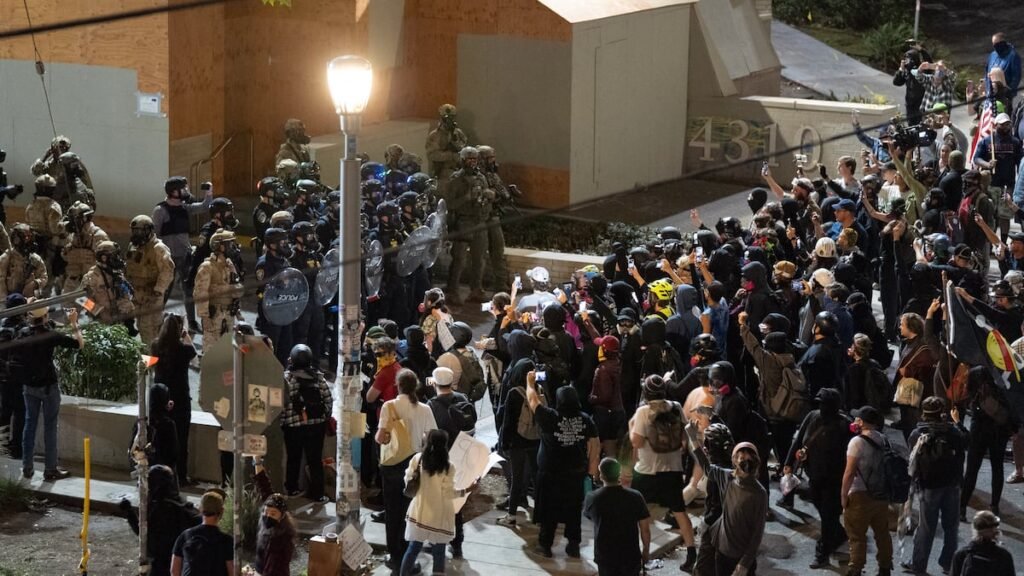Protests Erupt in Portland Against National Guard Deployment
On September 28, 2025, hundreds gathered outside the U.S. Immigration and Customs Enforcement (ICE) facility in Portland, Oregon, to protest the Trump administration’s decision to deploy National Guard troops to the city. This marked a significant escalation in tensions, with federal agents seen carrying long-barrel firearms and monitoring the crowd from rooftops.
A Diverse Assembly of Protesters
The protest drew a wide range of participants, from families with children to seasoned activists. Many demonstrators adopted the "black bloc" attire, characterized by ski masks and sunglasses, a style commonly associated with anti-fascist movements. The atmosphere was lively, with chants and drumming filling the air, though initial confrontations were largely absent.
As the day progressed, the protesting crowd disrupted local bus services and engaged in spirited discussions about perceived injustices. The presence of around 20 armed federal agents provided an intimidating backdrop, leading to confrontations later in the evening when protesters clashed with ICE agents attempting to escort a vehicle into the facility. Several protesters were reportedly hit with pepper balls during these encounters.
Counterprotesters and Confrontations
In a notable development, the event saw an increase in counterprotesters compared to previous nights. This led to verbal clashes, heightening the already charged atmosphere. Among the main protest organizers was Dina, a self-identified veteran’s wife, who fears for her family’s safety amidst what she called "illegal orders" from the administration. “We are not going to stand for this,” she declared, emphasizing the principled stance many protesters hold against their government’s actions.
The increased militarization of Portland has led many local leaders to question the necessity of these federal troops. A memorandum authorized by the Trump administration cited the need to protect ICE and other governmental personnel amid perceived threats of domestic terrorism—claims that many local officials dispute.
Local Leaders Respond
As tensions escalated in Portland, city and state leaders urged residents to remain calm and not provoke violence. However, many activists felt this sentiment downplayed the nature of their grievances. “We are average, everyday citizens tired of the illegal actions of this administration,” Dina pointed out, arguing against the notion that protesters are inherently dangerous.
Local Democrats have voiced strong opposition to the deployment of National Guard troops, calling it unnecessary and harmful to the community. Oregon’s Governor and other prominent leaders have described President Trump’s characterizations of Portland as exaggerated, insisting that conditions in the city do not warrant such a military presence.
In contrast, some Republican leaders have backed the deployment, claiming that Portland has deteriorated into a “crime-ridden war zone.” They argue that the National Guard’s presence is essential for maintaining law and order.
Legal Challenges
The state of Oregon and the city of Portland are currently pursuing legal action against the federal government, claiming the deployment oversteps constitutional boundaries. This legal battle highlights ongoing tensions between state rights and federal authority, further complicating the already fraught political landscape in the region.
Conclusion
As protests in Portland continue to unfold, the conversation surrounding the militarization of cities, federal authority, and local governance remains critical. The events of September 28, 2025, serve as a testament to the complexities of dissent in modern America, reflecting a population grappling with concerns over civil liberties and governmental overreach.
For further insights into this evolving story, you may explore more about Portland’s protests and the broader implications of federal troop deployments across the U.S.


